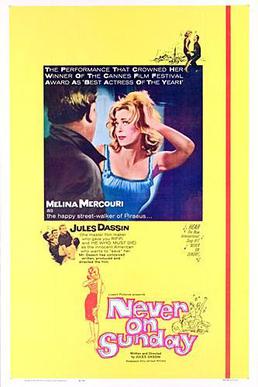
Never on Sunday is a 1960 Greek romantic comedy film starring, written by and directed by Jules Dassin.
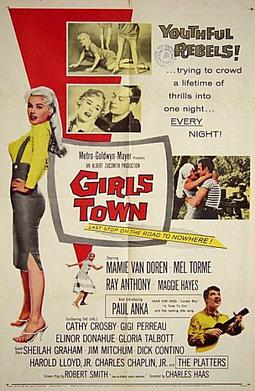
Girls Town is a 1959 American drama film directed by Charles F. Haas and starring Mamie Van Doren, Mel Tormé, and Ray Anthony. Paul Anka also appears in his first acting role. Van Doren stars as a juvenile delinquent who is sent to a girls' school run by nuns, where she finds herself unable to help her sister. The film capitalizes on the 1950s rebellious-teen exploitation films, with catfights, car races, music from Anka and The Platters, and sexy outfits.

La Notte is a 1961 drama film co-written and directed by Michelangelo Antonioni and starring Marcello Mastroianni, Jeanne Moreau and Monica Vitti. Filmed on location in Milan, the film depicts a single day and night in the lives of a disillusioned novelist (Mastroianni) and his alienated wife (Moreau) as they move through various social circles. The film continues Antonioni's tradition of abandoning traditional storytelling in favor of visual composition, atmosphere, and mood.
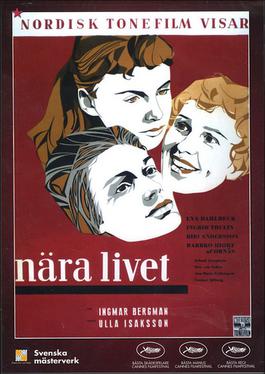
Brink of Life, is a 1958 Swedish drama film directed by Ingmar Bergman. At the 1958 Cannes Film Festival, Bergman won the Best Director Award, and Andersson, Dahlbeck, Ornäs and Thulin won the Best Actress Award.

Silver Spoon Set is a 1960 Italian–French drama film directed by Francesco Maselli starring Claudia Cardinale.

La Piscine is a 1969 psychological thriller film directed by Jacques Deray, starring Alain Delon, Romy Schneider, Maurice Ronet, and Jane Birkin.

Le pillole di Ercole is a 1960 Italian comedy film directed by Luciano Salce. It was shown as part of a retrospective on Italian comedy at the 67th Venice International Film Festival.
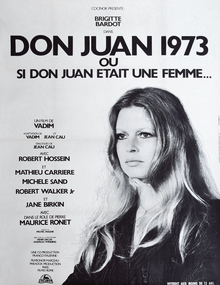
Don Juan, or If Don Juan Were a Woman is a 1973 erotic drama film directed by Roger Vadim. It sees Vadim reunite with his leading lady and ex-wife Brigitte Bardot for their fifth film together. Bardot achieved international stardom and Vadim got his break when he directed her in the 1956 film And God Created Woman.
Love Now, Pay Later is a 1959 West German drama film directed by Rudolf Jugert and starring Belinda Lee, Walter Rilla and Karl Schönböck. It was inspired by the life and death of Rosemarie Nitribitt.
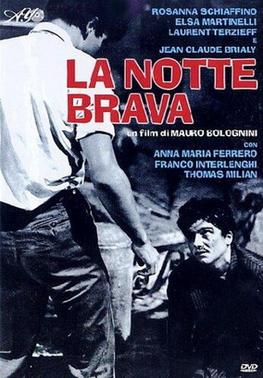
La notte brava is a 1959 Italian drama film directed by Mauro Bolognini. The film represents the debut of Tomas Milian in the Italian film industry.

Letto a tre piazze is a 1960 Italian Totò comedy film directed by Steno. The film marked the last collaboration between Totò and Lucio Fulci, author of the script and initially chosen as director.

Inga is a 1968 Swedish sexploitation film directed by Joseph W. Sarno. Later that year, Sarno also directed the sequel The Seduction of Inga. The musical soundtrack of the sequel was written and performed by Björn Ulvaeus and Benny Andersson, later of the Swedish pop group ABBA.
My Sister, My Love is a 1966 Swedish drama film, directed by Vilgot Sjöman.
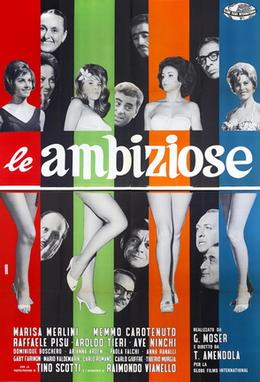
Le ambiziose is a 1961 Italian film directed by Antonio Amendola.

I piaceri dello scapolo is a 1960 Italian film directed by Giulio Petroni and starring Sylva Koscina and Mario Carotenuto.

Juke box - Urli d'amore is a 1959 "musicarello", directed by Mauro Morassi. The film stars Mario Carotenuto and the singers Mina and Adriano Celentano.

Death of a Friend is a 1959 Italian film directed by Franco Rossi, starring Spyros Focas, Gianni Garko, Angela Luce, Anna Mzzuchelli and Didi Perego.
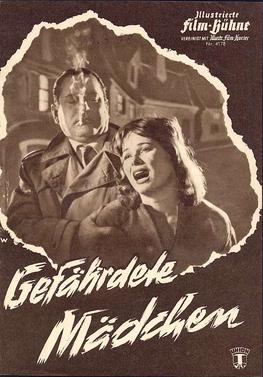
Endangered Girls is a 1958 German crime film directed by Wolfgang Glück and starring Gerlinde Locker, Wolf Albach-Retty and Heinz Drache. The film was released in the UK in 1959 as Dolls of Vice and in Italy in 1958 under the title Diecimila Donne Alla Deriva.
L’eau à la bouche is a 1960 French film directed by Jacques Doniol-Valcroze and starring Françoise Brion, Bernadette Lafont and Alexandra Stewart.

For Love and Others is a 1959 West German anthology film, directed by Jürgen Roland, Hans Heinrich and Reinhard Elsner. The film stars Monika Peitsch, Angelika Meissner and Paul Esser.
















